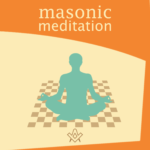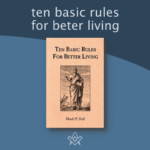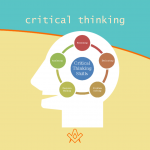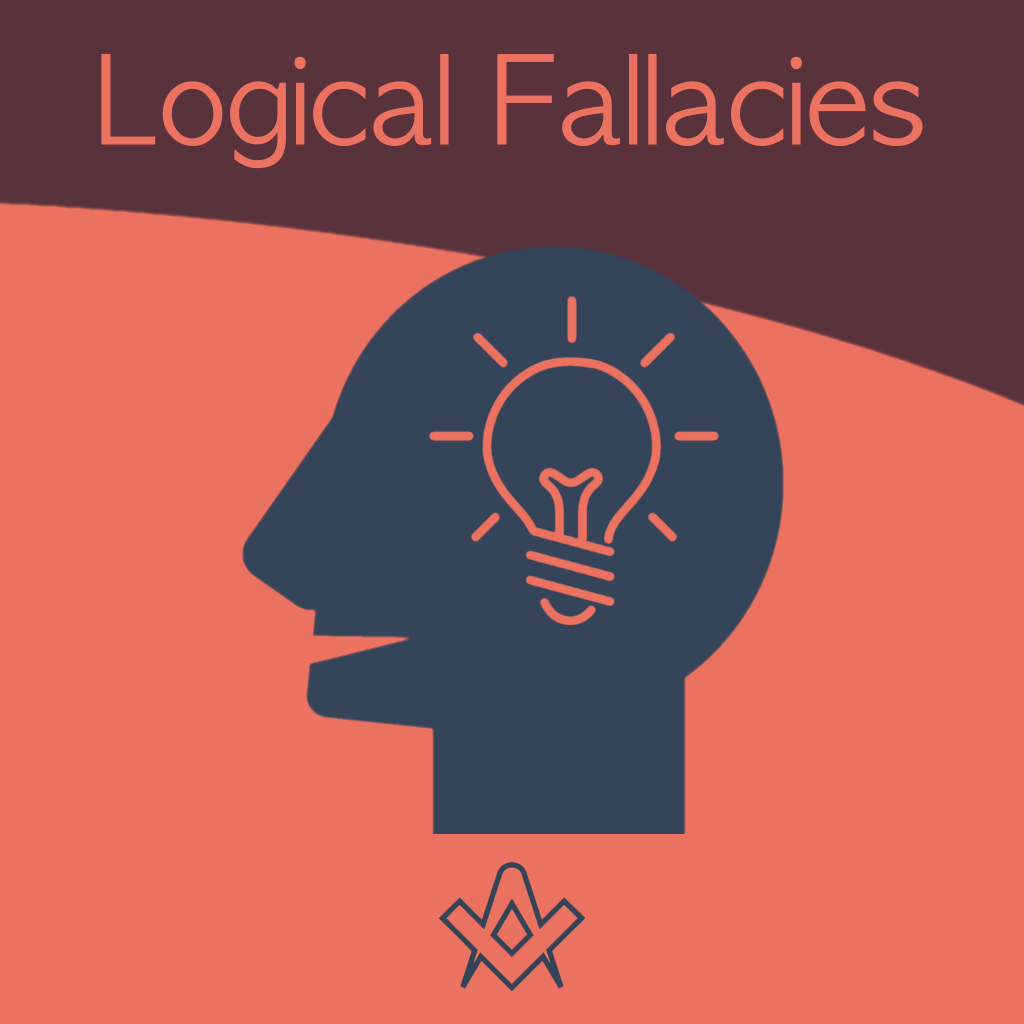Logic is one of the seven liberal arts and sciences – which as Masons we are reminded to study. Logic is part of the Trivium of the seven liberal arts and sciences – partnered with Grammar and Rhetoric – we cannot have a reasoned debate without employing the Trivium:
Grammar teaches the mechanics of language to the student. This is the step where the student ‘comes to terms’, defining the objects and information perceived by the five senses. Hence, the Law of Identity: a tree is a tree, and not a cat.
Logic (also dialectic) is the ‘mechanics’ of thought and of analysis, the process of composing sound arguments and identifying fallacious arguments and statements and so systematically removing contradictions, thereby producing factual knowledge that can be trusted.
Rhetoric is the application of language in order to instruct and to persuade the listener and the reader. It is the knowledge (grammar) now understood (logic) and being transmitted outwards as wisdom (rhetoric).
This sentence, from ‘15 Logical Fallacies You Should Know Before Getting Into a Debate‘ [The Best Schools] sums up the importance of logical reasoning:
One of the most important components of learning…is academic discourse, which requires argumentation and debate. Argumentation and debate inevitably lend themselves to flawed reasoning and rhetorical errors. Many of these errors are considered logical fallacies.
There are two types of fallacies:
Formal Fallacy – has true premises, but may still have a false conclusion.
Informal Fallacy – has a valid logical form and yet is unsound because one or more premises are false.
So, what is a logical – or informal – fallacy in everyday use?
It is important to understand what a logical fallacy is, not only so you avoid making one yourself but also being able to spot them when others fall into the trap of employing one.
They are often used to deflect discussions away from establishment of the truth.
Logical fallacies are often deployed consciously within the mainstream and social media as a way of perpetuating an ideology or mistruth.
People use logical fallacies every day, whether they understand they are doing it or not.
(Once you start to learn to spot them, it becomes a sport in identifying them, especailly during TV political debates, and of course social media posts).
Listed below are some of the most oft-used logical fallacies, many of which we will explore in further articles:
The Circular Argument – Petitio principii, meaning ‘Assuming the initial’; also known as ‘begging the question’.
The reasoner begins with what they are trying to end with – a claim using the conclusion as the premise.
For example, ‘The Bible is true, it says so in the Bible’. They are just repeating what they assume to be true, because the source it says it is true.
Hasty Generalizations – for example ‘this is the best song in the world!’
If we haven’t literally listened to all the songs in the world, we can’t logically make that statement.
So, hasty generalisations are one of the most difficult fallacies to ‘disprove’, as we do not have limits on what is sufficient evidence.
We make hasty generalisations ‘all of the time’ – that is a perfect example right there because we do so many other things with our time, so logically we are not doing anything ‘all of the time’…except perhaps breathing!
The Ad Hominem Fallacy – ad hominem translates from the Latin as ‘against the man’; in the vernacular it is known as ‘mudslinging’.
This fallacy is a favourite on social media and in the political arena – the rejection of someone else’s opinion or point of view by attacking the person directly – calling someone an idiot, or including an insult pertaining to their physical appearance, background, race, political leanings etc., which are irrelevant to the argument.
But an ad hominem is more than a simple insult, it is used as if it were an argument or evidence to support a conclusion and proves nothing about whether the person’s argument was true or false.
Straw Man Argument – A ‘straw man’ argument is an informal fallacy whereby someone gives the impression of refuting an argument, whilst not addressing the main premise of the argument under discussion.
One who engages in this type of debate is said to be ‘attacking a straw man’ – they distort or mis-represent an opinion or argument, making it easier to defeat.
Straw Man and Slippery Slope work well together – an example of this might be:
A: We must wear masks to slow down the spread of the virus
B: Oh great, muzzle us to keep us subservient – don’t you realise wearing a mask can cause oxygen deprivation? It’s just a way of controlling us, there IS no virus!
Slippery Slope – this fallacy is pretty much summed up by its name; it is an debate or discussion that starts with a relatively insignificant first event leads to a more significant event, which in turn leads to a more significant event, and so on, with each step becoming more and more improbable and rapidly descends to a (usually) catastrophic conclusion.
A bit like the ‘mask’ example above, Slippery Slope goes from A to B to Z…very quickly!
Bandwagon Fallacy – ever heard the term ‘to jump on the bandwagon’?
This fallacy assumes something is good, right or true because other people think it is.
The Bandwagon fallacy is an umbrella term for several fallacies that are almost identical – the ad populum fallacy (‘to the populus’ – meaning something is accepted due to being popular) and concensus gentium (‘consensus of the people’ – meaning acceptance of something by relevant authorities or people).
Bandwagon fallacy is something used in advertising, the media and in politics – making something attractive due to association with something or someone who is popular – it’s the classic premise that ‘9 out of 10 cats prefer it’!
The Bandwagon fallacy has a darker side – we see it in the ‘echo chambers’ on social media – the blind acceptance of a claim or action because a vast number of people appear to agree with it, does not make it right or justified.
‘Mob mentality’ can then rule and we are witnessing how destructive this can be with the new phenomena of people with different views being ‘cancelled’, bullied or ‘doxed’ (doxing is where private information about an individual is published online with malicious intent).
Appeal to Ignorance – argumentum ad ignorantiam – this is when ignorance is used as the major premise in a supporting argument.
Appealing to ignorance isn’t proof of anything, except proof that you don’t know something! It even ‘works’ for contradictory claims, for example:
‘No one has ever been able to prove definitively that God exists, therefore he exists.’
‘No one has ever been able to prove definitively that god exists, therefore he doesn’t exist.’
Using an argument strategy to support mutually exclusive claims just shows that you don’t have a decent argument.
Top 10 Logical Fallacies

Logic as a Liberal Art:
An Introduction to Rhetoric and Reasoning
by Rollen Edward Houser
In the twenty-first century there are two ways to study logic.
The more recent approach is symbolic logic. The history of teaching logic since World War II, however, casts doubt on the idea that symbolic logic is best for a first logic course.
Logic as a Liberal Art is designed as part of a minority approach, teaching logic in the “verbal” way, in the student’s “natural” language, the approach invented by Aristotle.
On utilitarian grounds alone, this “verbal” approach is superior for a first course in logic, for the whole range of students.
For millennia, this “verbal” approach to logic was taught in conjunction with grammar and rhetoric, christened the trivium.
The decline in teaching grammar and rhetoric in American secondary schools has led Dr. Rollen Edward Houser to develop this book.
The first part treats grammar, rhetoric, and the essential nature of logic.
Those teachers who look down upon rhetoric are free, of course, to skip those lessons. The treatment of logic itself follows Aristotle’s division of the three acts of the mind (Prior Analytics 1.1).
Formal logic is then taken up in Aristotle’s order, with Parts on the logic of Terms, Propositions, and Arguments.
The emphasis in Logic as a Liberal Art is on learning logic through doing problems.
Consequently, there are more problems in each lesson than would be found, for example, in many textbooks.
In addition, a special effort has been made to have easy, medium, and difficult problems in each Problem Set.
In this way the problem sets are designed to offer a challenge to all students, from those most in need of a logic course to the very best students.
Recent Articles: skills
 7 Soft Skills Taught In Freemasonry Discover how Freemasonry nurtures seven irreplaceable soft skills—collaboration; Communication, Teamwork, Empathy, Flexibility, Conflict Resolution, Active Listening, and Trustworthiness. Explore how these essential human attributes, grounded in emotional intelligence and ethical judgment, remain beyond the reach of AI. |
 Freemasonry and Reskilling in the age of AI The article explores the challenges and strategies organizations face in reskilling their workforce in the era of automation and artificial intelligence. It highlights the need for companies to view reskilling as a strategic imperative and involve leaders and managers in the process. The article also emphasizes the importance of change management, designing programs from the employee's perspective, and partnering with external entities. |
 Ten Central Commandments or Principles of Freemasonry Embrace the wisdom of Freemasonry's teachings in your personal journey towards self-improvement and stronger leadership. By upholding virtues of integrity, compassion, and respect, and uniting these with a commitment to continuous learning and social responsibility, inspire change. Transform yourself and the world around you, fostering a legacy of positivity and enlightenment. |
 Freemasonry: A Guide to Fatherhood In the sacred halls of Freemasonry, fathers discover a hidden power to transform their parenting journey. With its timeless values, supportive community, and life-enriching teachings, Freemasonry empowers fathers to provide a moral compass, foster self-improvement, build stronger connections, and embrace the confidence and wisdom needed to navigate the complex realm of fatherhood. |
 Courage as a core value in Freemasonry Freemasonry, a revered fraternity, prioritizes virtues like honesty and charity. However, courage is foundational. From Plato to Maya Angelou, courage is vital for other virtues. Freemasonry's teachings, referencing events like Gettysburg, emphasize diverse courage forms. In today's divided world, Masons promote and exemplify courage, understanding its importance in facing challenges. |
 How Freemasonry Cultivates Ideal Entrepreneurial Traits Freemasonry's cryptic rituals hold timeless lessons for building entrepreneurial greatness. Through tests of passion, vision and skill, Masonic teachings forge ideal traits like grit, creativity and alliance-making needed to seize opportunity and elevate enterprises. The right commitment unlocks code for entrepreneurial success. |
 What you see praiseworthy in others "What you see praiseworthy in others, carefully imitate, and what in them may appear defective, you will in yourself amend". This passage of Masonic ritual (Taylors Working, Address to the w |
 How to Learn Ritual with a Learning Disorder So what do you do when faced with that little blue book? Most Masons when first looking at the ritual book can understandably be fazed – the tiny print, the missing words, the questions and answers! Learning ritual can be a challenging task for anyone, especially individuals with learning disorders, but it is not impossible. Here are some tips to help make the process easier. |
 A "mind palace", also known as a "memory palace", is a technique for memorizing and recalling information. How would your life change if you could remember anything and everything? Discover the 'Mind Palace' and all will be revealed. |
 What is leadership and who does freemasonry help develop those skills needed to be a better leader |
 A story of the 'Ruffians' – those individuals whose paths cross ours, who feel entitled to seize and consume the property of others that they have not earned. A lesson to build character to be a better citizen of the world. |
 Now we are back in the Lodge room once again, maybe it is time to review how we learn and deliver ritual and look at different ways of improving that process. |
 Making an advancement in Masonic Knowledge can become far easier when you 'learn how to learn'. |
 Learn how to practise Masonic meditation in a busy world with all its care and employments |
 Struggling to learn your ritual? Become a 5-Minute Ritualist with the aid of a book of the same name. |
 Day in the life of a Freemason As we start a new year, maybe start it with a new habit? |
 Ten Basic Rules For Better Living Ten Basic Rules For Better Living by Manly P Hall |
 How can we use masonic leadership skills to avoid confrontational situations? |
 How the Trivium is applied to Critical Thinking - {who, what, where, when} - {how} - {why} |
 The Seven Liberal Arts - why 'seven', why 'liberal', why 'arts'? |
 How to improve your public speaking skill with 6 techniques |
 Do you need to speak in public, or present Masonic ritual without notes ? |
 What are logical Fallacies and how to spot them |
 Share one easy tip to learn masonic ritual; Some good tips from Facebook followers |
 How can we use the 7 secrets of the greatest speakers in history |
 What is a critical thinker and what are their characteristics? |
 Share one personal skill Freemasonry helped you to improve? How can we make practical use of the lessons taught in Masonic writings? |
 An introduction to the art of public speaking - speak with confidence |
 Seven Liberal Arts and Sciences What do you know about Seven Liberal Arts and Sciences |
 Three Words That Will Change Your Life This article discuss a common situation found in many lodges - a difficulty in holding a conversation with a stranger. |
 Al - Khwarizmi live c750 - c820 is credited as being the father of Algebra, being asked what is Man, give his answer in an algebraic expression |
masonic knowledge
to be a better citizen of the world
share the square with two brothers

click image to open email app on mobile device









